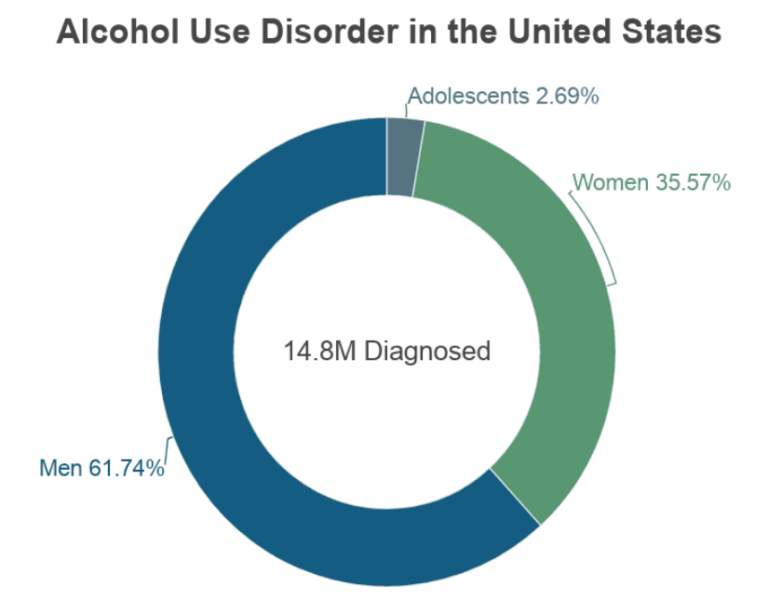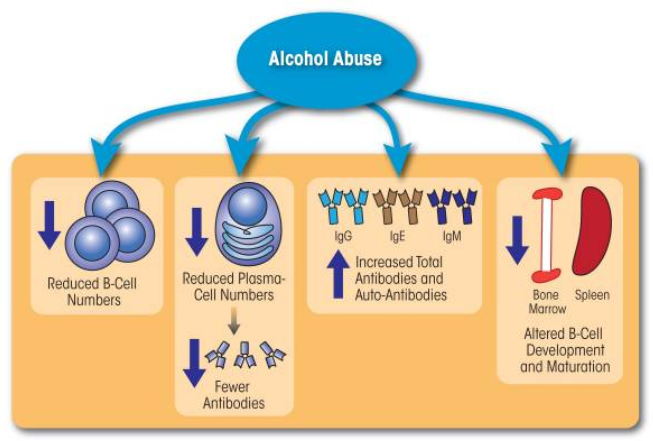Written by Brandon Okey. Mina Draskovic, B.Psy., reviewed this content for accuracy.
High-functioning alcoholics seem to have it all together—holding down jobs and maintaining relationships while secretly battling alcohol addiction. But just because they’re functioning doesn’t mean they’re not doing serious damage to their health, relationships, and future.
Their outward success makes it easy to deny or overlook the problem, both for them and the people around them. That’s why high-functioning alcoholism demands a comprehensive treatment approach for lasting recovery. We provide specialized alcohol rehab programs that address the unique challenges faced by high-functioning alcoholics.
High-functioning alcoholics struggle with alcohol addiction but manage to maintain a facade of normalcy in their professional and social lives. Unlike the stereotypical image of an alcoholic—blackouts, rages, DUIs, and a wake of destruction—these people often hold down good jobs, have families, and seem successful on the surface.
Beneath this veneer, they’re battling a serious drinking problem that affects their health, relationships, and overall well-being.
The main characteristics of a high-functioning alcoholic:
Many people don’t realize their friend or family member is a high-functioning alcoholic until cracks start to show. It often takes a major incident or a series of slip-ups for loved ones to recognize the hidden problem.
High-functioning alcoholics are masters of disguise, hiding their addiction behind a facade of success. But even the most skilled pretenders can’t completely mask the physical and behavioral signs of chronic alcohol abuse.
High-functioning alcoholics often have some or all of the following physical symptoms:
Behavior is a telltale sign of a high-functioning alcoholic. The shifts in behavior might be subtle at first, easily dismissed or explained away. But over time, they become more pronounced and harder to ignore.
Alcohol withdrawal symptoms can be severe and potentially life-threatening. For high-functioning alcoholics, these symptoms might catch them off guard, especially since they’ve often maintained the illusion of control over their drinking. The danger is amplified because they may attempt to manage withdrawal on their own, risking serious complications.
If you recognize you need help managing your drinking, Ardu Recovery Center is here to support you. Our alcohol detox services provide a safe, comfortable environment for you to begin your recovery journey. We’re equipped to help functional alcoholics navigate the often unexpected and potentially dangerous withdrawal symptoms and transition to a healthier, alcohol-free life.
A groundbreaking study by Dr. Moss and his team at the National Institute on Alcohol Abuse and Alcoholism (NIAAA) sheds light on the diverse world of alcohol dependence. They dug into data from nearly 1,500 people diagnosed with alcoholism, looking at everything from family history to when they started drinking regularly. They found that there isn’t just one type of alcoholic, but several distinct groups. A significant portion of them are high-functioning alcoholics.
Let’s break down the types of alcoholics and how common they are:

A 2014 Harvard Health study suggests that nearly one-third of American adults drink excessively, but only 10% of them have alcohol use disorder (AUD). This implies that many excessive drinkers may be functioning without meeting the clinical criteria for alcoholism.
Read our in-depth article about alcohol abuse statistics in the United States, and you can find out how many millions of Americans struggle with heavy drinking and alcohol use disorder.
The insidious nature of high-functioning alcoholism allows it to progress undetected for years, sometimes decades, causing gradual but significant damage to physical health, mental well-being, and personal relationships.
Let’s pull back the curtain on the hidden health risks these individuals face.
High-functioning alcoholics often experience silent liver damage. Chronic alcohol consumption can lead to fatty liver disease, where excess fat accumulates in liver cells. Continued alcohol consumption use will lead to increased inflammation that will inevitably cause permanent damage.
The liver sustains the greatest degree of tissue injury by heavy drinking because it is the primary site of ethanol metabolism. Chronic and excessive alcohol consumption produces a wide spectrum of hepatic lesions, the most characteristic of which are steatosis, hepatitis, and fibrosis/cirrhosis. (Osna, et. al.)
Despite the severe damage alcohol can inflict on the liver, this resilient organ has a remarkable ability to regenerate. Your liver will heal when you stop drinking, but you need to make that important decision as soon as possible.
Alcohol abuse takes a toll on the heart and blood vessels. Binge drinking can lead to hypertension (high blood pressure), increasing the risk of heart attacks and strokes. Prolonged heavy drinking can also weaken the heart muscle, leading to cardiomyopathy, and contribute to irregular heartbeats (arrhythmias).
A 2022 study explains the detrimental cardiovascular effects of chronic alcohol abuse and binge drinking patterns. The results show that chronic alcohol abuse is linked to sudden cardiac death and heart muscle damage. Overall, regular heavy drinkers have a higher risk of dying from heart-related issues.
Despite maintaining professional and social facades, high-functioning alcoholics may experience gradual brain damage. Alcohol can lead to brain shrinkage, impacting areas responsible for memory, learning, and cognitive function. This can result in difficulties with problem-solving, decision-making, and memory retention, even if not immediately apparent to others.
According to Meda, et. al., “individuals with heavier drinking patterns had a larger rate hippo-parahippocampal volume decline.” Excessive drinking shrinks the brain’s memory center, leading to more blackouts and worse memory over time.
Chronic alcohol consumption suppresses the immune system, making functional alcoholics more susceptible to infections and illnesses. A 2015 study found an “association between excessive alcohol consumption and adverse immune-related health effects.” This increased vulnerability can lead to more frequent colds, flu, and other infections, as well as slower recovery times.
Even moderate alcohol consumption can exert detrimental effects on your immune system and health in the long run. The smartest thing you can do is to steer clear of the bottle altogether. That’s not always easy, especially after years of heavy drinking, but Ardu will be there by your side, every step of the way.
If you’re struggling to remain sober, seek the support of our qualified rehab facility.
Alcohol irritates the digestive system. High-functioning alcoholics may develop gastritis (inflammation of the stomach lining), peptic ulcers, and pancreatitis. Chronic alcohol use can also interfere with nutrient absorption, leading to malnutrition despite adequate food intake.
Bishehsari, et. al. shed light on the havoc alcohol wreaks on your gut and found that booze disrupts the beneficial bacteria in your stomach lining, making your intestines more permeable. This triggers widespread inflammation, causing problems throughout your entire body, not just your digestive system.
While high-functioning alcoholics may seem to have their lives together, they’re at increased risk for mental health issues. Alcohol abuse can exacerbate or trigger depression, anxiety, bipolar disorder, and other minor and major mental disorders. The cycle of drinking to cope with stress or emotions can worsen these mental health challenges over time.
Ardu offers specialized dual diagnosis treatment to tackle these intertwined challenges. Our comprehensive approach addresses both alcohol addiction and underlying mental health issues, providing a path to holistic recovery and lasting well-being.
Although alcohol might seem to help with falling asleep, it significantly disrupts sleep patterns. Roehrs and Roth found that alcohol’s sedative effects cause initial drowsiness by acting as a depressant, slowing brain activity and causing muscles to relax. Despite these seemingly soothing effects, high-functioning alcoholics often experience poor sleep quality, insomnia, and sleep apnea. This chronic sleep deprivation leads to daytime fatigue, decreased productivity, and mood disturbances, potentially impacting their work and relationships.
Chronic alcohol consumption interferes with the body’s ability to absorb and utilize essential nutrients. High-functioning alcoholics may develop deficiencies in vitamins and minerals such as thiamine, folate, and magnesium. Alcohol-induced nutritional deficiencies can have detrimental effects on your health and cause a range of health problems, such as anemia, weakened bones, and neurological issues. To make matters worse, many of these may not be immediately apparent but can have long-term consequences.
High-functioning alcoholics face elevated risks of certain cancers. Alcohol is a known carcinogen, affecting the liver, breast, mouth, throat, and esophagus. The World Health Organization warns that “no level of alcohol consumption is safe for our health.” They maintain that “alcohol is a toxic, psychoactive, and dependence-producing substance and has been classified as a Group 1 carcinogen by the International Agency for Research on Cancer decades ago – this is the highest risk group…”
When your liver breaks down alcohol, it first creates acetaldehyde, a toxic and cancer-causing substance. This harmful compound inflames and damages cells in your throat and digestive system, leading to abnormal cell growth and injury. Seitz, et. al. suggest that the risk increases with the amount of alcohol consumed over time, regardless of the person’s ability to function in daily life.

Ardu Recovery Center is committed to helping you break free from alcohol dependence. Our comprehensive approach includes medically supervised detox, counseling, group support, and holistic therapies that guide you toward lasting recovery and overall well-being.
Contact Ardu today and take your life back into your hands.
High-functioning alcoholism presents a complex challenge to treat. Unlike the stereotypical image of alcoholism, high-functioning alcoholics often excel in their careers, maintain relationships, and fulfill social obligations, all while consuming alcohol at harmful levels.
High-functioning alcoholics are particularly challenging to treat for several reasons:
The treatment of high-functioning alcoholism demands a sophisticated, balanced approach. It requires addressing the addiction while preserving the individual’s functional aspects. This challenge calls for expert knowledge of the many psychological, social, and physical factors that contribute to this complex condition.
Ardu Recovery Center offers expert, comprehensive care tailored to these unique challenges.








“…I cannot speak highly enough of Ardu Recovery Center. They have not only helped me overcome addiction but have equipped me with the tools and mindset to maintain a sober and fulfilling life. If you or a loved one are seeking the best substance abuse rehab facility in the state, look no further than Ardu Recovery Center. They have truly set the standard for excellence in care and support. They are truly like family to me…”
We recognize the complex nature of high-functioning alcoholism and offer a sophisticated, multifaceted approach to treatment. Our program provides comprehensive care that respects the delicate balance between addressing the underlying addiction and preserving the functional aspects of our client’s lives. We understand that high-functioning alcoholics often have demanding careers, family responsibilities, and social obligations that cannot be entirely disrupted during the recovery process.
At Ardu, we employ a team of experienced professionals who are well-versed in the nuances of high-functioning alcoholism. Our experts utilize a combination of evidence-based therapies, holistic treatments, and innovative approaches to create individualized treatment plans. These plans are carefully crafted to address not only the alcohol dependence but also the underlying factors that contribute to it, such as stress, mental health issues, or unresolved trauma.
The first crucial step in overcoming alcohol addiction is detoxification, a process that requires a safe and controlled environment. Our detox services provide precisely that. Withdrawal can be severe and potentially life-threatening, which is why our medically supervised detox program ensures your comfort and safety throughout this challenging phase.
Our medical team closely monitors your vital signs, manages withdrawal symptoms, and provides necessary medications to ease discomfort. Our supportive staff is available 24/7 to provide care, encouragement, and the medical expertise needed to guide you safely through this critical first step towards a life free from alcohol dependence.
When you successfully finish the detox process, the journey to recovery continues with rehabilitation.
After detox, the crucial phase in overcoming alcohol addiction begins. Our rehab programs address the underlying causes of addiction and equip you with the tools needed for long-term sobriety. You’ll engage in different therapeutic modalities, including individual counseling, group therapy, and holistic treatments such as yoga, meditation, nutritional therapy, and art therapy. These sessions help you understand your addiction, develop coping strategies, and build a strong foundation for recovery.
We also focus on life skills training, stress management, and relapse prevention techniques.
For high-functioning individuals, our rehab programs offer the flexibility to maintain professional commitments while receiving intensive treatment. We tailor our approach to your unique needs, making sure that you can navigate recovery without compromising your career or personal responsibilities.
At Ardu, we employ a range of therapies and treatments tailored to address high-functioning alcoholism:
Our experienced professionals are equipped to handle even the most severe cases of alcohol addiction. We offer a comprehensive range of services tailored to meet the unique needs of each resident. We understand the significant challenges our clients face, so we strive to make the recovery process as comfortable and effective as possible.
To enroll in an Ardu program, contact us online or via phone (801-872-8480). We will find a recovery path that works for you during detox and beyond.

Brandon Okey is the co-founder of Ardu Recovery Center and is dedicated to empowering people on their journey to sobriety.
Alcoholics don’t necessarily have more dopamine, but their brains respond differently to it. Chronic alcohol use alters the brain’s reward system, making it more sensitive to alcohol-induced dopamine release. This leads to increased cravings and tolerance. Over time, they may experience a decrease in natural dopamine production, requiring more alcohol to achieve the same pleasurable effects.
This dopamine dysregulation contributes to the cycle of addiction. The relationship between alcohol and dopamine is complex and involves different neurotransmitters and brain regions.
A bottle of wine daily is excessive drinking and can lead to serious health consequences. Moderate drinking is up to one glass per day for women and two for men; a bottle of wine far exceeds these limits. Regular heavy drinking increases the risk of liver disease, heart problems, certain cancers, and mental health issues. It can also lead to alcohol dependence and impact personal and professional relationships.
Alcohol can cause permanent brain damage, especially with long-term heavy use. Chronic alcohol abuse can lead to brain shrinkage, particularly affecting areas responsible for memory, learning, and decision-making. It can cause Wernicke-Korsakoff syndrome, a severe form of brain damage resulting from thiamine deficiency. Alcohol also disrupts neurotransmitter balance, potentially leading to lasting changes in brain function.
While some effects of alcohol on the brain may be reversible with abstinence, certain types of damage can be permanent. The developing brains of adolescents and young adults are particularly vulnerable. The brain has some capacity for healing, and early intervention can minimize long-term damage.
Alcohol doesn’t directly lower IQ scores, but it can significantly impair cognitive functions that IQ tests measure. Chronic heavy drinking can lead to deficits in problem-solving, memory, and processing speed—all components of intelligence. Long-term alcohol abuse may cause brain shrinkage in areas crucial for these cognitive functions. Adolescents are particularly vulnerable, because alcohol interferes with brain development, potentially affecting IQ potential.
Some cognitive effects may be reversible with abstinence. IQ is just one measure of intelligence and alcohol affects many aspects of mental and emotional functioning. The relationship between alcohol and cognitive ability is complex and involves factors such as genetics, drinking patterns, and overall health.
Alcohol-related dementia, also known as alcohol-induced dementia or Wernicke-Korsakoff syndrome, is a form of cognitive decline caused by long-term, heavy alcohol use. It results from brain damage. Alcohol is a toxin and causes nutritional deficiencies, particularly in thiamine (vitamin B1). Alcohol dementia often affects people in their 50s and 60s, earlier than most other types of dementia.
Symptoms of alcohol dementia include:
Unlike other forms of dementia, some symptoms may improve with abstinence and proper nutrition. Severe cases can lead to permanent cognitive impairment.
Drinking alcohol every night can have serious health consequences.
The cumulative effects of nightly drinking can significantly reduce overall health and life quality.
Researchers Identify Alcoholism Subtypes. (2015, September 29). National Institutes of Health (NIH). https://www.nih.gov/news-events/news-releases/researchers-identify-alcoholism-subtypes
Skerrett, P. J. (2014, November 22). Heavy drinkers aren’t necessarily alcoholics but may be “almost alcoholics” Harvard Health. https://www.health.harvard.edu/blog/heavy-drinkers-arent-necessarily-alcoholics-may-almost-alcoholics-201411217539
Osna, N. A., & Kharbanda, K. K. (2017). Alcoholic Liver Disease: Pathogenesis and Current Management. Alcohol Research: Current Reviews, 38(2), 147-161. https://www.ncbi.nlm.nih.gov/pmc/articles/PMC5513682/
Chudzińska, M., Wołowiec, Ł., Banach, J., Rogowicz, D., & Grześk, G. (2022). Alcohol and Cardiovascular Diseases—Do the Consumption Pattern and Dose Make the Difference? Journal of Cardiovascular Development and Disease, 9(10), 317. https://doi.org/10.3390/jcdd9100317
Meda, S. A., Hawkins, K. A., Dager, A. D., Tennen, H., Khadka, S., Austad, C. S., Wood, R. M., Raskin, S., Fallahi, C. R., & Pearlson, G. D. (2018). Longitudinal effects of alcohol consumption on the hippocampus and parahippocampus in college students. Biological Psychiatry. Cognitive Neuroscience and Neuroimaging, 3(7), 610. https://doi.org/10.1016/j.bpsc.2018.02.006
Sarkar, D., Jung, M. K., & Wang, H. J. (2015). Alcohol and the Immune System. Alcohol Research: Current Reviews, 37(2), 153-155. https://www.ncbi.nlm.nih.gov/pmc/articles/PMC4590612/
Bishehsari, F., Magno, E., Swanson, G., Desai, V., Voigt, R. M., Forsyth, C. B., & Keshavarzian, A. (2017). Alcohol and Gut-Derived Inflammation. Alcohol Research: Current Reviews, 38(2), 163-171. https://www.ncbi.nlm.nih.gov/pmc/articles/PMC5513683/
Roehrs, T., & Roth, T. (1995). Alcohol-Induced Sleepiness and Memory Function. Alcohol Health and Research World, 19(2), 130-135. https://www.ncbi.nlm.nih.gov/pmc/articles/PMC6875726/
No level of alcohol consumption is safe for our health. (2023, January 4). https://www.who.int/europe/news/item/04-01-2023-no-level-of-alcohol-consumption-is-safe-for-our-health
Seitz, H. K., & Becker, P. (2007). Alcohol Metabolism and Cancer Risk. Alcohol Research & Health, 30(1), 38-47. https://www.ncbi.nlm.nih.gov/pmc/articles/PMC3860434/
How to recognize alcohol poisoning
What is the best way to stop drinking?
Can alcohol affect birth control?
How to safely detox from alcohol
Why is alcohol bad for my mental health?